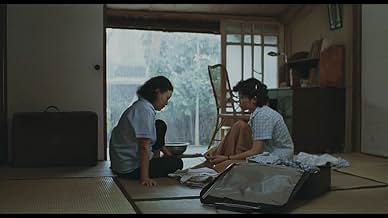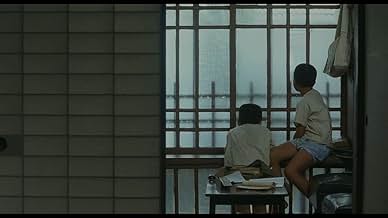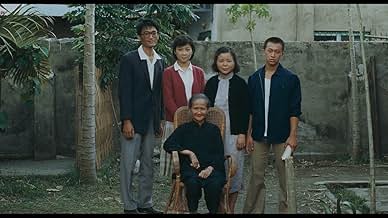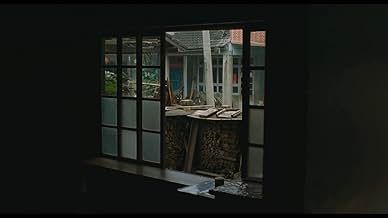CALIFICACIÓN DE IMDb
7.5/10
3.8 k
TU CALIFICACIÓN
Agrega una trama en tu idiomaThe semi-autobiographical film on director Hou Hsiao-Hsien's childhood and adolescence, when he was growing up in Taiwan, living through the deaths of his father, mother and grandmother.The semi-autobiographical film on director Hou Hsiao-Hsien's childhood and adolescence, when he was growing up in Taiwan, living through the deaths of his father, mother and grandmother.The semi-autobiographical film on director Hou Hsiao-Hsien's childhood and adolescence, when he was growing up in Taiwan, living through the deaths of his father, mother and grandmother.
- Dirección
- Guionistas
- Elenco
- Premios
- 8 premios ganados y 5 nominaciones en total
- Dirección
- Guionistas
- Todo el elenco y el equipo
- Producción, taquilla y más en IMDbPro
Opiniones destacadas
Seeking a better life, a teacher brings his family from Mei County in the Kwangtung Province of mainland China to Fengshan in the south of Taiwan in 1947. As a result of the Communist takeover on the mainland, the family is forced to remain in Taiwan, estranged from their traditional home and culture. The Time to Live and The Time to Die, a semi-autobiographical film by Taiwanese director Hou Hsiao-Hsien, is a compassionate story of a family's struggle to adapt to living in a new society. Loosely based on the childhood memories of Taiwanese director Hou Hsiao-Hsien who came to Taiwan in 1948, the film chronicles the passing of the older generation and the emergence of the new. The director narrates the film from the point of view of the youngest son, Ah-Hsiao (You Anshun), called Ah-ha by his grandmother (Tang Yu-Yuen).
The Time to Live is shot in a reflective style that allows an intimacy with the material. In the first half, the family learns to adjust to their new environment: the children play outside, the family eats dinner together and engage in small family rituals. Hou is observant of the political and technological changes taking place in the background, noting, for example, the increasing number of cars and motorcycles on the streets, the installation of electricity in their home, the improving medical treatment that the parents receive, and a letter from an aunt revealing the Great Leap Forward in China. What doesn't change, however, is the continued second class status of women, depicted in a scene where the mother lectures the daughters about their responsibilities for housework and how it must come before an education.
As the family gets older, the longing for their homeland increases. On several occasions, the old grandmother becomes disoriented and asks shopkeepers for directions to the Mekong Bridge (in China). When she gets lost, she has to be returned home via taxicab. The second half of the film painfully shows the loss of parental guidance and the disintegration of the family. As illness sets in, the parent's pain and slow disintegration takes place directly in front of the camera, not in the background. Ah Hsiao and his siblings stoically endure the loss of both parents, but their growing involvement in delinquency and petty crime underscores the loss of structure in their lives.
This is Hou's most personal film and one that is filled with images of extraordinary power. I was moved to see Ah Hsiao face when he sees death for the first time while walking into the room containing his father's body, and when the family shares loving recollections of the father soon after his death. Backed by a lyrical soundtrack, the street scenes and images of family life convey a rare authenticity and visual poetry. As in the film "Pather Panchali" by Satyajit Ray, the tiny village in Taiwan becomes a microcosm of the outside world. Like Ray's masterpiece, it is a sad film, yet, in its celebration of the wonder of life and the strength of the human spirit, it is also triumphant. The Time to Live and the Time to Die is not only a loving tribute of one son to his family but a testament to the strength of all families.
The Time to Live is shot in a reflective style that allows an intimacy with the material. In the first half, the family learns to adjust to their new environment: the children play outside, the family eats dinner together and engage in small family rituals. Hou is observant of the political and technological changes taking place in the background, noting, for example, the increasing number of cars and motorcycles on the streets, the installation of electricity in their home, the improving medical treatment that the parents receive, and a letter from an aunt revealing the Great Leap Forward in China. What doesn't change, however, is the continued second class status of women, depicted in a scene where the mother lectures the daughters about their responsibilities for housework and how it must come before an education.
As the family gets older, the longing for their homeland increases. On several occasions, the old grandmother becomes disoriented and asks shopkeepers for directions to the Mekong Bridge (in China). When she gets lost, she has to be returned home via taxicab. The second half of the film painfully shows the loss of parental guidance and the disintegration of the family. As illness sets in, the parent's pain and slow disintegration takes place directly in front of the camera, not in the background. Ah Hsiao and his siblings stoically endure the loss of both parents, but their growing involvement in delinquency and petty crime underscores the loss of structure in their lives.
This is Hou's most personal film and one that is filled with images of extraordinary power. I was moved to see Ah Hsiao face when he sees death for the first time while walking into the room containing his father's body, and when the family shares loving recollections of the father soon after his death. Backed by a lyrical soundtrack, the street scenes and images of family life convey a rare authenticity and visual poetry. As in the film "Pather Panchali" by Satyajit Ray, the tiny village in Taiwan becomes a microcosm of the outside world. Like Ray's masterpiece, it is a sad film, yet, in its celebration of the wonder of life and the strength of the human spirit, it is also triumphant. The Time to Live and the Time to Die is not only a loving tribute of one son to his family but a testament to the strength of all families.
Although I think The Puppetmaster is the real best masterpiece of Hao, Time to live and the time to die is the one I love most. Despite the implication and background of Taiwan history in the film, as I am not so clear about it and not close to me, the story about growing-up is the reason that the film move me so much. The trip of the main kid "ar Ha" and his grandma become the warmest and most unforgettable part of the film. By the way, I think the relatively slow and quiet style of Hao extremely suit the story of rural and history background, much better than modern city background.
I recommend A TIME TO LIVE AND A TIME TO DIE as a great introduction to the films of Hou Hsiao Hsien, who I consider the greatest director working today. Like most of his films, this one is about the telling of history, the effort to recreate the memories of the past, in this case his childhood memories growing up in rural Taiwan. His family has escaped Communist China but live as if they will make their return someday. That someday never comes, the family grows old, and members die one by one. These tragedies (filmed with heartbreaking solemnity) serve as punctuation marks for the film's narrative, which isn't so much concerned with plot details as it is with capturing the sense of what it was like to live at that time, as the kids develop their own sense of belonging, in a country they have adpoted just as it has adopted them. His method of editing and storytelling is something close to revolutionary, and he would refine it in his later films. His ability to set scene after impeccable scene and let the ideas ferment over their totality is unparalleled. This is perhaps his most accessible film, full of heart and pathos. It may seem slowgoing by Hollywood standards, but if you have the willingness to let it wash over you, you will be transported, both mentally and emotionally.
It's kinda weird and almost become universal, many of the screenplay writers and directors in Asian Pacific area, such as Taiwan, China, Japan, Korea, Thailand, Vietnam...seemed to never be able to grow out of their teenage syndrome and phobia of their young and immature romances and loves. The formulaic trend, if I tried to trace it back, most likely was from Japan, originally from their Manga, their anti-social young writers who never had the working experiences or social lives, stayed in their bedrooms, read animated Manga stories, then wrote about their own limited experience from their elementary school to their high school, retrospected their puppy loves to their classmates, boys or girls in their uniforms, timid, shy and reserved, didn't know how to express their love to their opposite gender.
Ho is just one of them, so typically unable to grow out of such remembrance of his teenage love loss and his inability to deal with those impotent situations again and again. It changed and narrowed his thinking, lifestyle and sexuality. His movies most were nostalgic to his teenage time, about the young and fruitless romances, the melancholy regrets, the failures of his romantic adventures in a tightly conservative society he grew up with. His and many other similar Taiwanese writers and directors are exactly like those Japanese and Korean counterparts, many of their products are about romances in uniforms and satchels, after-school encounters, or shyness during classes to each other. These kind of romances never lost their charm to their audiences in puberty, never failed in box office. But it narrowed and hurt their advances in literature and movie production since they couldn't and even refused to grow out it.
It's time for you guys to grow up, not just to grow out of it!
Ho is just one of them, so typically unable to grow out of such remembrance of his teenage love loss and his inability to deal with those impotent situations again and again. It changed and narrowed his thinking, lifestyle and sexuality. His movies most were nostalgic to his teenage time, about the young and fruitless romances, the melancholy regrets, the failures of his romantic adventures in a tightly conservative society he grew up with. His and many other similar Taiwanese writers and directors are exactly like those Japanese and Korean counterparts, many of their products are about romances in uniforms and satchels, after-school encounters, or shyness during classes to each other. These kind of romances never lost their charm to their audiences in puberty, never failed in box office. But it narrowed and hurt their advances in literature and movie production since they couldn't and even refused to grow out it.
It's time for you guys to grow up, not just to grow out of it!
"A Time to Live and a Time to Die" reads like a family saga, but it is just as much a film about the passing of traditional China and the dislocation of exile. Of course the plot points are given away; Hou isn't interested in dramatic tension and Aristotelian unities--these are so dependent on Western ideas of
personality and the separation of individual and world that they make little
sense in China. He doesn't push the events in our faces, either--they just
happen, often in the middle distance with a tree in the foreground, the way real life happens. (Remember Auden's "Musee de Beaux Arts", with Icarus plunging
in the sea far off while a ploughman works on his field?)
The space Hou gives his events and his characters doesn't give us the intimacy with people that we expect in the West. But it gives us a rich sense of the
texture of life and the things that pass among members of a family and a
community, even one that is thrown together and can just as suddenly fall
apart, as it begins to here. It's that feeling for social space, in part, that allows this film and others of his to address social and historical questions without ever losing the sharp particularity of a personal story.
personality and the separation of individual and world that they make little
sense in China. He doesn't push the events in our faces, either--they just
happen, often in the middle distance with a tree in the foreground, the way real life happens. (Remember Auden's "Musee de Beaux Arts", with Icarus plunging
in the sea far off while a ploughman works on his field?)
The space Hou gives his events and his characters doesn't give us the intimacy with people that we expect in the West. But it gives us a rich sense of the
texture of life and the things that pass among members of a family and a
community, even one that is thrown together and can just as suddenly fall
apart, as it begins to here. It's that feeling for social space, in part, that allows this film and others of his to address social and historical questions without ever losing the sharp particularity of a personal story.
¿Sabías que…?
- TriviaThis film is inspired by screenwriter-turned-director Hou Hsiao-Hsien's coming-of-age story. It is the second installment of Hou Hsiao-Hsien's "Coming-of-Age Trilogy" that features three prominent Taiwanese screenwriters' coming-of-age stories - the other two are Dong dong de jiàqi (1984) (inspired by the childhood memories of Chu Tien-Wen) and Liàn liàn fengchén (1986) (inspired by the coming-of-age story of Wu Nien-Jen).
- ConexionesFeatured in When Cinema Reflects the Times: Hou Hsiao-Hsien and Edward Yang (1993)
Selecciones populares
Inicia sesión para calificar y agrega a la lista de videos para obtener recomendaciones personalizadas
- How long is A Time to Live and a Time to Die?Con tecnología de Alexa
Detalles
- Fecha de lanzamiento
- País de origen
- Sitio oficial
- Idiomas
- También se conoce como
- A Time to Live and a Time to Die
- Locaciones de filmación
- Productoras
- Ver más créditos de la compañía en IMDbPro
Contribuir a esta página
Sugiere una edición o agrega el contenido que falta

Principales brechas de datos
By what name was Tiempo de vivir, tiempo de morir (1985) officially released in India in English?
Responda





















